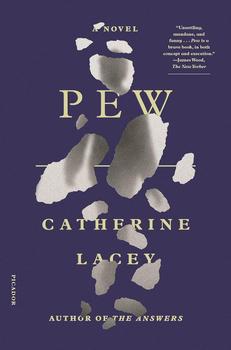Page 1 of 1
There is 1 reader review for Pew
Write your own review!
 Cathryn Conroy
Chilling Fable About Identity: A Cross Between
Cathryn Conroy
Chilling Fable About Identity: A Cross Between
An unhoused young teenager seeks refuge in a church one dark night and falls asleep in a pew. The child of indeterminate background, age, gender, and race is awakened when a family of five sits in the pew on a Sunday morning awaiting the start of worship services.
And so it begins. This chilling, haunting novel by Catherine Lacey is a cross between Shirley Jackson's short story "The Lottery" and the movie "Pleasantville," starring Toby Maguire and Reese Witherspoon. On one level it is emotionally complex and introspective, but on another level it is dark and unsettling. It is a profound fable about the meaning and necessity of identity in human interaction.
It is the Bonner family—Steven and Hilda and their three sons—who find the child in the pew. Since the child won't speak and tell their name, the preacher names them "Pew." The novel takes place over one week—from Sunday to Saturday—in an unnamed Southern town. The residents think it is idyllic.
Pew is found on Sunday, but the whole town is abuzz about the annual Forgiveness Festival that will take place on Saturday, a ritualized event first organized years ago by the small town's churches. The week before this mysterious festival can be dangerous—and this is the week Pew has arrived—because some people think they can do whatever they want and then be forgiven for it a few days later. In addition, there is an unsettling rumor about the festival, one that is intensified by the presence of many police officers lining the streets on Saturday.
Pew's backstory is murky at best, since they can't remember anything about their prior life or parents—just fleeting glimpses and snapshots that don't lead to any kind of revelation. So even if Pew were willing to talk, there isn't much to share.
While some think Pew is an angel sent to them by God and one woman believes Pew is Jesus, the inability to identify Pew in the ways we humans think of as required causes misunderstandings and anger for some people. Almost everyone who encounters Pew one-on-one—from small children to the elderly—confesses their deepest secrets and thoughts. Pew takes it all in. Pew is able to see things in people that pierce through the protective masks we all wear; it's almost as if Pew can see into others' souls.
I'm not sure I understood the ending; it was as indeterminate as Pew's identity—confusing and ambiguous, which is a bit poetic since it aligns with everything about Pew.
